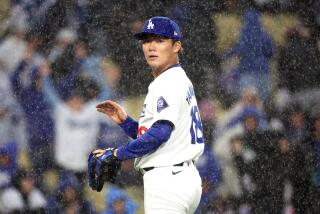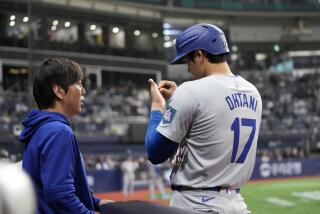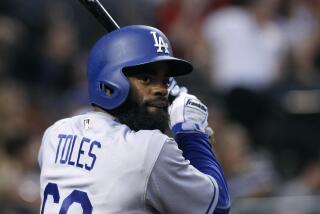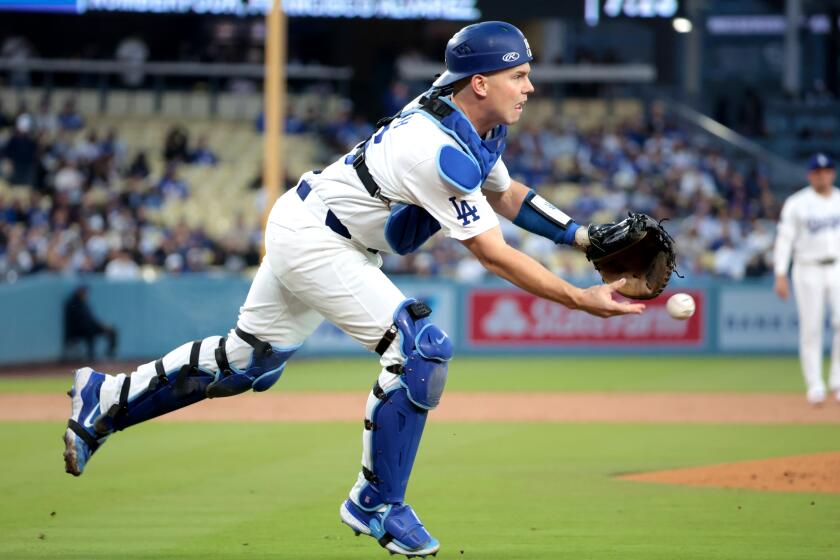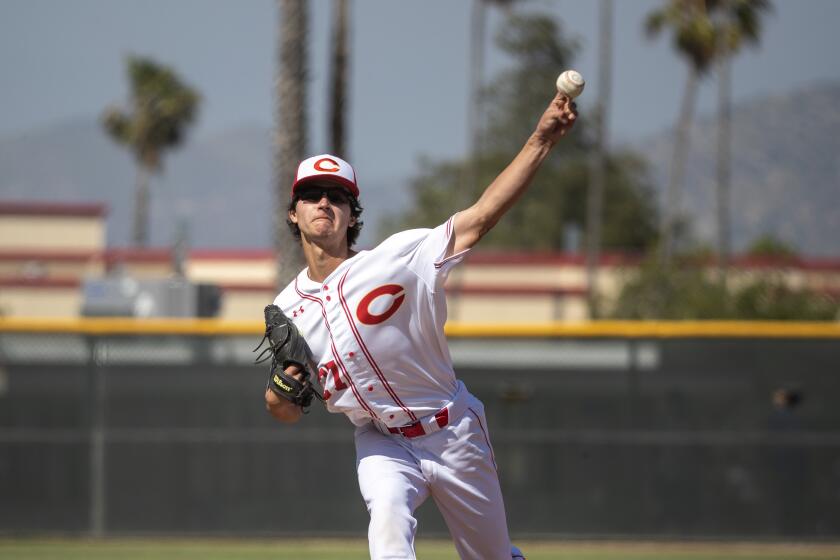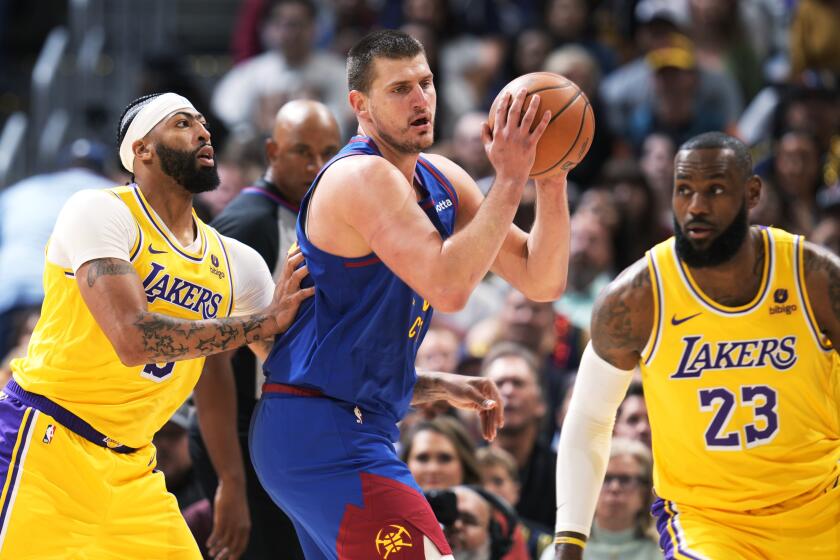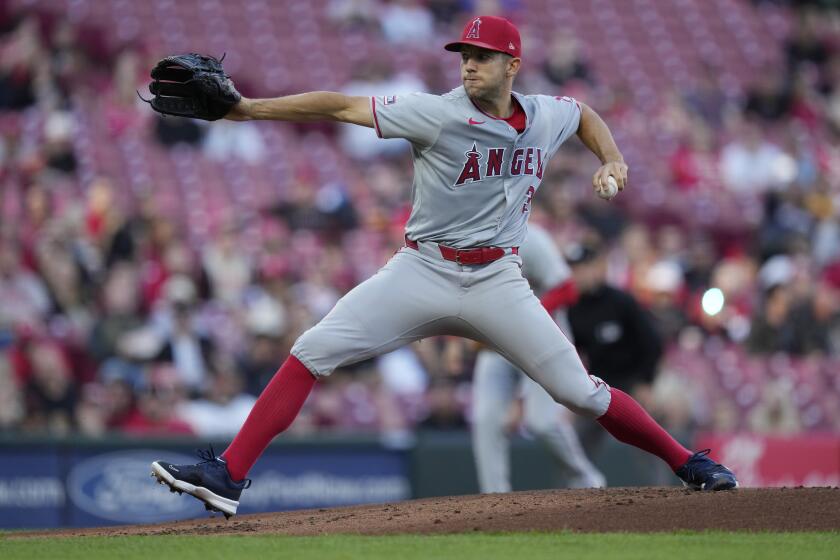Zack Greinke gets through anxious moments
PHOENIX — His face is shadowed under an oversized baseball cap. His gaze is often averted to the ceiling or floor. His handshake is distant, his voice is small, his sentences trail off into awkward silence.
The first impression of Dodgers pitcher Zack Greinke is that, despite having just signed a $147-million deal with a team in baseball’s second-largest market, he simply wants to run away and hide.
It is a daily act of courage that he does not.
“I didn’t think there was anything wrong with me,” he said Friday. “But there is, I guess.”
Greinke will be paid more than any right-handed pitcher in baseball history to serve as one of the new centerpieces on a Dodgers team that has been rebuilt to challenge for a championship. Yet seven years ago, he was too uncomfortable in public to even throw a pitch.
Greinke walked away from the Kansas City Royals and missed two months of the 2006 season with what was eventually diagnosed as social anxiety disorder and clinical depression. He returned to the minor leagues hoping only to become functional. It turns out, he became great, eventually winning the Cy Young Award for the Royals in 2009, winning a playoff game for the Milwaukee Brewers, and briefly pitching for the Angels before eventually winding up in front of a small group of reporters Friday in his first truly personal interview as a Dodger.
“I’ve already talked about this a bunch,” the slight 29-year-old warned everyone. “I’ll get into it a little, but it won’t be the best interview of your all’s lives.”
Twenty-five minutes later it ended as an interview that, painfully candid and quietly strong, felt like a triumph.
Social anxiety disorder, a condition shared by millions, is marked by extreme discomfort when a person is placed in social situations. Greinke was clearly uncomfortable Friday, yet he answered every question with an honesty that many players can’t even summon when discussing a silly game. In a macho baseball clubhouse culture where human frailties are considered condemnable weaknesses, Greinke might as well have been pitching underhand, yet he brought it hard.
“I’m not afraid to say it, that’s what it is,” he said of his condition. “I’d rather get it off [his chest] than try to hide it. I’d have to spend energy trying to hide it.”
He talked about the feelings that first plagued him in high school.
“I don’t know a good way to put it — it’s having anxiety every day,” he said. “It’s not fun. I wouldn’t call it painful, but it’s definitely not enjoyable.”
He talked about finally succumbing when he walked out of the Royals’ spring training camp at the start of his third big league season, in 2006. He endured one bullpen session where he was so vexed he couldn’t throw a strike, winging each pitch with increasing recklessness and speed. Afterward, with onlookers staring in sad confusion, he walked off the mound and — he thought — out of the game forever.
“Why am I putting myself through this torture when I don’t really want to do it?” he recalled feeling. “I enjoyed playing, but I didn’t enjoy anything else about it. I was like, ‘I’ll go do something I really want to do.’”
He talked about returning to the game after being diagnosed with a disorder that he never even knew existed.
“I realized there was something abnormal about my feelings and there was a way to get rid of them,” he said.
It has been written that he was helped with therapy and drugs, but he said that’s only half right. He said it was all about the drugs, revealing that he takes one Zoloft pill every day.
“For me, it’s just the medicine, it really was,” he said. “Talking to people about it doesn’t help me at all. It is just straight medication; it changed everything.”
He said that, contrary to popular assumption, a pitching mound surrounded by thousands of people is actually his refuge. “I don’t mind people looking at me, that’s never bothered me,” he said. “I don’t want them looking at me in my house; now that would bother me.”
He said that’s one of the reasons he signed as a free agent in a giant place like Los Angeles. He doesn’t mind being watched by crowds. It’s the close personal encounters that bother him. He figures Hollywood is the perfect place for him to be completely anonymous.
“I don’t want people following me around, everywhere I go, people talking to me and stuff,” he said. “I don’t want to be walking down the street with a bodyguard. I don’t think that will be an issue playing in L.A.”
However, he said he is so intimidated by the traffic that he contemplated renting a Kobe Bryant-style helicopter before learning he couldn’t land it near Dodger Stadium.
“I was just driving through there; it’s the biggest city in the universe. How far it goes, I don’t know how big it is, but that thing never ends,” he said of Los Angeles.
The Dodgers knew he felt like this, which is why the most impressive part of his free-agent interview was how and where it was conducted. Most top free agents insist on teams traveling to see them and their phalanx of agents, but Greinke insisted on flying from his Orlando home to Los Angeles with his wife, Emily. Once here, he drove to Dodger Stadium for the interview by himself.
“It was one of most impressive sit-down meetings I’ve had with a player,” General Manager Ned Colletti said. “He was by himself, giving us completely unfiltered answers. It was like, ‘Here I am, guys.’”
Here he is, indeed, even though, once the season begins, his Dodgers teammates will barely notice him. He has become so resilient in so many ways, yet remains so vulnerable in others. He won’t be part of this Dodgers clubhouse chemistry business, as he often stays to himself, unwilling to endure small talk.
“I don’t like to just talk about nothing, or less than nothing,” he said. “If it’s something interesting, I’m fine with it, but, ‘Hey, Zack, how is your day?’ People ask that and somebody actually tells them what happened in their day? I don’t have any real interest in that.”
All the Dodgers need to know about Zack Greinke’s day, they will know when he shows up. Every day is a challenging day. Every day is great day.
Twitter: @billplaschke
More to Read
Get our high school sports newsletter
Prep Rally is devoted to the SoCal high school sports experience, bringing you scores, stories and a behind-the-scenes look at what makes prep sports so popular.
You may occasionally receive promotional content from the Los Angeles Times.
